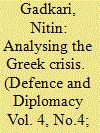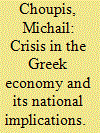| Srl | Item |
| 1 |
ID:
141369


|
|
|
| 2 |
ID:
105539


|
|
|
| 3 |
ID:
094304


|
|
|
|
|
| Publication |
2010.
|
| Summary/Abstract |
Under its Kyoto and EU obligations, Greece has committed to a greenhouse gas (GHG) emissions increase of at most 25% compared to 1990 levels, to be achieved during the period 2008-2012. Although this restriction was initially regarded as being realistic, information derived from GHG emissions inventories shows that an increase of approximately 28% has already taken place between 1990 and 2005, highlighting the need for immediate action. This paper explores the reallocation of production in Greece, on a sector-by-sector basis, in order to meet overall demand constraints and GHG emissions targets. We pose a constrained optimization problem, taking into account the Greek environmental input-output matrix for 2005, the amount of utilized energy and pollution reduction options. We examine two scenarios, limiting fluctuations in sectoral production to at most 10% and 15%, respectively, compared to baseline (2005) values. Our results indicate that (i) GHG emissions can be reduced significantly with relatively limited effects on GVP growth rates, and that (ii) greater cutbacks in GHG emissions can be achieved as more flexible production scenarios are allowed.
|
|
|
|
|
|
|
|
|
|
|
|
|
|
|
|
| 4 |
ID:
134218


|
|
|
|
|
| Publication |
2014.
|
| Summary/Abstract |
This paper asks why Japan has not yet suffered from a sovereign debt crisis, although its gross public debt as a percentage of GDP is much higher than in Greece. We use a simple stylized model to explain the occurrence of both a fundamental and a speculative debt crisis. We apply this model to both countries and derive some hypotheses about why investors are still ready to hold Japanese Government Bonds. In particular, we point to the significance of domestic debt holdings, to the central bank's government debt purchases, to investors' access to "safe havens," and to the role of an autonomous monetary policy. We also analyze potential challenges to Japan's long-term fiscal situation, resulting from its aging population.
|
|
|
|
|
|
|
|
|
|
|
|
|
|
|
|
| 5 |
ID:
154168


|
|
|
|
|
| Summary/Abstract |
During the 1960s Italy and Greece were undergoing rapid economic and social changes that were significant in both their economic and political ramifications. US policy was able to influence the course of events either bilaterally or multilaterally in the context of the Bretton Woods nexus of institutions and procedures. The central argument of this essay is that Washington's policy was formulated under various contradictory considerations. Cardinal among them was the necessity of preserving the basic requirements of the Bretton Woods regime. The stability of currency parities, particularly the safeguarding of the preeminent position of the dollar as an international reserve currency and its credibility against gold, dictated the continuation of orthodox monetary and fiscal policies. Political stability in Italy and Greece as a prop against political radicalization was a strategic consideration that militated against a strict application of a deflationary policy. The development of transatlantic relations with Charles de Gaulle's France posed a problem from an Allied perspective and was a factor that also militated against the strict application of a policy of monetary stability.
|
|
|
|
|
|
|
|
|
|
|
|
|
|
|
|